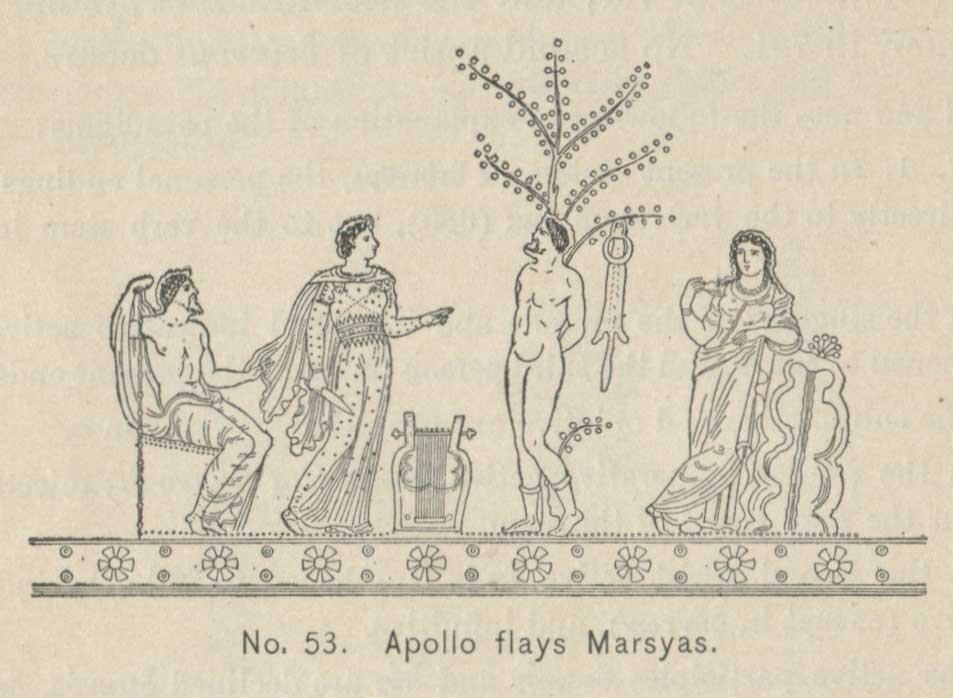THE FIRST GREEK BOOK
BY JOHN WILLIAMS WHITE, PH.D, LL.D., LITT.D.
Professor Of Ancient Greek At Harvard University
This Revision Copyright ©2012 by Shawn Irwin
Lesson LXXVII - Regular Verbs in ΜΙ, δείκνῡμι.
S711. Learn the conjugation of the present system of δείκνῡμι (δεικ), show,
in 787, and the second aorist system of δῡω (δυ), enter, in 791. No second aorist of
δείκνῡμι occurs.
Read and note the following in explanation of the paradigms:
S712. 1. In the present system of δείκνῡμι, the personal endings are not
added directly to the verb stem δεικ (689), but to the verb stem increased by νυ.
2. In the singular of the present and imperfect indicative active, δεικνυ is lengthened to δεικνῡ,
and the third person plural of the present ends in ᾱσι.
3. The subjunctive and optative are formed as in verbs in ω.
4. In the present imperative active, δείκνῡ (for δεικνυ-θι) rejects
θι and lengthens the final vowel of the stem.
5. In the second aorist active, δυ is lengthened to δῡ in the
indicative, imperative (except in δύντων), and infinitive.
6. The active participles δεικνύς, and δῡς, are declined
δεικνύς, δεικνῦσα, δεικνύν, genitive δεικνύντος, δεικνύσης, δεικνύντος, etc.
7. The second aorist middle does not occur.
S713. VOCABULARY
ἀποδείκνῡμι, set forth, make known, appoint; middle, set forth one's views, declare.
ἀπόλλῡμι, destroy utterly, kill, middle., with second perfect active, perish, die, be lost.
Ἀπόλλων, ωνος, ὁ, Αpollo.
δείκνῡμι, (δεικ), δείξω, ἔδειξα, δέδειχα, δέδειγμαι, ἐδείχθην, show.
δέρω, δερῶ, ἔδειρα, δέδαρμαι, ἐδάρην (compare δέρμα), flay.
δύω, δύσω, ἔδῡσα and ἔδῡν, δέδῡκα, δέδυμαι, ἐδύθην, make enter, intransitive, enter.
ἐκδέρω, strip off the skin, flay.
ἐνδύω, put on, clothe oneself in.
ἐπιδείκνῡμι, show to, exhibit, disclose.
ἑυρίσκω, (εὑρ), ἑυρήσω, ηὗρον, ηὕρηκα, ηὕρημαι, ηὑρέθην, find, discover; middle, find for oneself, procure.
κρεμάννυμι, (κρεμα), κρεμῶ, ἐκρέμασα, ἐκρεμάσθην, hang up.
Μαρσύᾱς, οὐ, ῾o, Marsyas, a satyr.
ὀλλῡμι, (ὀλ), ὀλῶ, ὤλεσα and ὠλόμην, ὀλώλεκα and
ὄλωλα, destroy, lose; middle with second perfect active, perish.
ὄμνῡμι, (ὀμ, ὀμο), ὀμοῦμαι, ὤμοσα, ὀμώμοκα, ὀμώμομαι and ὀμώμοσμαι, ὠμόθην
and ὠμόσθην, swear, take an oath.
S714.
1. ἀποδείκνυνταιοἱ μάντεις πάντες γνώμην ὄτι μάχη οὐκ ἔσται.
2. τοὺς ἄνδρας αὐτοὺς οἷς ὤμνυτε ἀπολωλέκατε.
3. οἱ δὲ ὀπλῖται τοῦ Μένωνος ὑπολειφθέντες καὶ οὐ δυνάμενοι εὐρεῖν τό ἄλλο στράτευμα ἀπώλοντο.
4. καὶ ἀποτεμόντες τὰς κεφαλὰς τῶν νεκρῶν, ἐπεδείκνυσαν τοῖς ἑαυτῶν πολεμίοις.
5. τοῖς παισὶν ἐδείκνυσαν ὅ τι δέοι ποιεῖν.
6. ἐνταῦθα λέγεται ἀπόλλων ἐκδεῖραι Μαρσύᾱν καὶ τὸ δέρμα κρεμάσαι.
7. κώμην δὲ δείξᾱs αὐτοῖς ὅπου σκηνήσουσι ἀπεπορεύθη.
8. Κῦρος τὸν θώρᾱκα ἐνέδῡ.
9. βουλόμενος οὖν Κῦρος ἐπιδεικνύναι τό στράτευμα, ἐξέτασιν ποιεῖται
ἐν τῷ πεδίῳ τῶν Ἑλλήνων καὶ τῶν βαρβάρων.

S715.
1. Hereupon he expresses his opinion.
2. After him another rose up, pointing out what must be done.
3. He disclosed the plot to the general.
4. They put on their breast plates and ordered arms.
5. Many of the beasts of burden perished.
S716. The Greeks charge on the Run, and the Enemy take to Flight.
καὶ οὐκέτι τρία ἢ τέτταρα στάδια διειχέτην τὼ φάλαγγε ἀπ᾽ ἀλλήλων
ἡνίκα ἐπαιάνιζον τε οἱ Ἕλληνες καὶ ἤρχοντο ἀντίοι ιἔναι τοῖς πολεμίοις.
ὡς δὲ πορευομένων τῶν Ἐλλήνων ἐξεκύμαινε μέρος τι τῆς φάλαγγος, τὸ
ὑπολειπόμενον ἤρξατο δρόμῳ θεῖν˙ καὶ ἄμα ἐφθέγξαντο πάντες, καὶ
πάντες δὲ ἔθεον. λέγουσι δὲ τινες ὡς καὶ ταῖς ἀσπίσι πρὸς τὰ δόρατα
ἐδούπησαν, φόβον ποιούντες τοῖς ἵπποις. πρὶν δὲ τόξευμα ἐξκνεῖσθαι,
ἐκκλίνουσιν οἱ βάρβαροι καὶ φεύγουσι. καὶ ἐνταῦθα δὴ ἐδίωκον μὲν
κατὰ κράτος οἱ Ἔλληνες, ἐβόων δὲ ἀλλήλοις μὴ θεῖν δρόμῳ, ἀλλ᾽ ἐν
τάξει ἕπεσθαι.
καὶ οὐκέτι . . .ἀλλήλων: i.e., the two lines (dual) were less than three or four stades (accusative of extent of space, (836) apart. this was less than half a mile.
ἐπαιάνιζον: began to sing the paean, as an omen of victory.
ἀντίοι ιἔναι: to go to meet, to go against. For the following dative, see 863.
ὡς δὲ φάλαγγος: when, as the Greeks proceeded (genitive absolute, 516) a part of the phalanx surged, forward (see ἐκκῡμαίνω), literally billowed out.
τὸ ὑπολειπόμενον: equivalent to οἱ ἄλλοι. See 487, 3 and 4.
καὶ πάντες δὲ: compare 667, 7.
ἀσπίσι: dative of instrument (866).
ἵπποις: dative of disadvantage (861 ).
πρὶν . . .ἐξικνεῖσθαι: before an arrow reached them (536), i.e. before the Greeks were within bowshot.
See the route on the map.
End Of Chapter
INDEX
Chapter 79
HOME
This Revision Copyright ©2012 by Shawn Irwin
